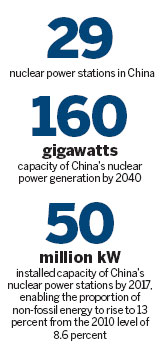

Building nuclear power plants in inland areas of China is a rational choice for the country's energy plan, with the potential risks all under control, experts say.
Most of the country's nuclear reactors are in coastal areas, where energy is scarce and electricity demand huge.
But some inland provinces, such as Hunan, Hubei and Jiangxi, plan to build nuclear power plants to solve their energy problems, said Zhao Yongkang, deputy director of the Nuclear Safety Management Department at the Environmental Protection Ministry.

Chen Xiaoqiu, deputy chief engineer of the ministry's Nuclear and Radiation Safety Center, said setting up nuclear reactors solely along the coast cannot meet inland cities' growing demand for green energy, or sustain the power network during extreme weather conditions.
He said the installed capacity of nuclear power plants in coastal regions is limited and insufficient to support the scale of development planned for the country's nuclear power.
"Developing inland nuclear power plants is an effective method to optimize energy distribution and to ease the burden of coal transportation," Chen said.
"It is also a must-have measure to clear the smog and improve air quality in many regions, such as North China and the Yangtze River Delta cluster."
Chen said nuclear reactors have great resistance to earthquakes, and inland areas of China have no meteorological or geological conditions in which tsunami can form, so accidents like the radiation leak at Japan's Fukushima Daiichi nuclear power plant more than two years ago are not likely to happen in China.
Zhao said it is very difficult to find a suitable location for a nuclear power plant.
"We have to take all kinds of possible natural conditions into account, such as the wind, the water, the possibility of natural disasters and interference from human activities," he said.
Chen said most of the nuclear reactors in many other countries are in inland regions.
"Fourteen of the 19 nuclear power plants in France are in inland areas, while more than 60 percent of the nuclear reactors in the US are also located inland. Many nuclear power plants in Central Europe, Eastern Europe and Russia are also in inland areas."
Chen said the safety standards for inland nuclear power plants are similar to those for coastal ones, but with a stricter emission standard for radioactive effluents with low radiation.